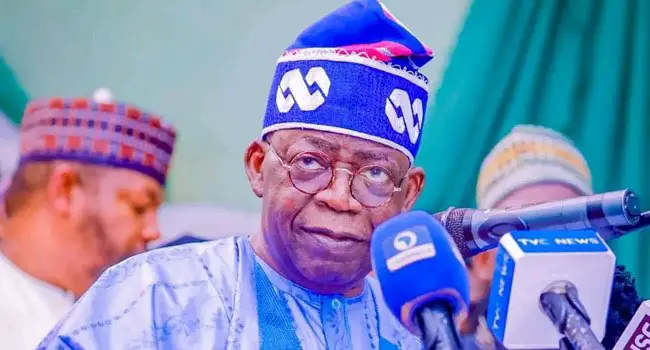By Sa’eed Harun
The last election witnessed a remarkable political phenomenon when Northern Nigeria overwhelmingly supported the candidacy of Bola Ahmed Tinubu. This commentary seeks to delve into the underlying factors that contributed to this massive support and shed light on the reasons behind such a voting pattern including the controversies surrounding the idea that northern Nigerians voted for Tinubu based on his health standing, with the prospect of Vice President Shettima assuming power upon his death. This claim raises questions about the motivations behind voting patterns and the role of regional politics in Nigerian elections.
One of the major reasons for Northern Nigeria’s support for Tinubu can be traced back to historical alliances and connections. Tinubu, a respected political figure from the Southwest region, has consistently demonstrated an inclusive approach, fostering national unity and building bridges across diverse ethnic and regional lines. His ideology resonated with the people of Northern Nigeria, and his reputation as a unifying force sparked a sense of trust and belief that he could address their concerns effectively.
It’s pertinent to note that Tinubu’s proven track record in economic development played a pivotal role in securing the support of Northern Nigeria. The region has been grappling with numerous socio-economic challenges, including high poverty rates and unemployment. Recognizing Tinubu’s success in transforming Lagos into an economic hub, Northern Nigerians saw him as a potential catalyst for similar transformation in their region. His proposed policies emphasizing job creation, infrastructure development, and entrepreneurship appealed to voters who sought a better future.
Another significant factor contributing to Tinubu’s overwhelming support was the alliances he forged with influential politicians from the Northern region. By collaborating with key power brokers and stakeholders, Tinubu ensured his message reached a wider audience and secured endorsements from prominent Northern leaders. These alliances not only lent him credibility but also demonstrated his commitment to a united Nigeria by bridging regional divides.
Ethnic and religious factors are crucial in Nigerian politics, and Tinubu’s ability to navigate these complexities contributed to his popularity in Northern Nigeria. He cultivated relationships with religious leaders, demonstrating respect for their beliefs and values. By promoting inclusivity and ensuring representation of diverse ethnic groups, Tinubu reassured Northern Nigerians that their interests would be protected under his leadership. This strategic approach helped him gain the trust and support of communities across the region.
When evaluating the claim that northern Nigerians voted for Tinubu based on his health standing, it is essential to consider the diversity of motivations that influence voting patterns. Voters are driven by various factors, including ideological alignment, party affiliation, personal attributes of candidates, and their perceptions of their ability to govern effectively. While health may be one concern among many, it is unlikely to be the sole determining factor in the voting decisions of an entire region.
More so, Tinubu’s campaign strategy played a vital role in garnering support from Northern Nigeria. He invested time and effort in understanding the specific needs and aspirations of the region, tailoring his policies to address them effectively. By engaging in grassroots campaigns, town hall meetings, and listening to the concerns of the people, Tinubu demonstrated a commitment to participatory governance. This personalized approach resonated with voters, fostering a stronger connection and leading to mass support.
The overwhelming support for Bola Ahmed Tinubu in Northern Nigeria during the last election can be attributed to various factors. His reputation as a unifying force, economic development initiatives, political alliances, ethno-religious considerations, security concerns, and effective campaign strategies all played a pivotal role in gaining the trust and support of the region. As Nigeria continues to strive for national unity and progress, leaders who can bridge regional divides and address the socio-economic challenges faced by different regions are likely to earn the support of the people.



